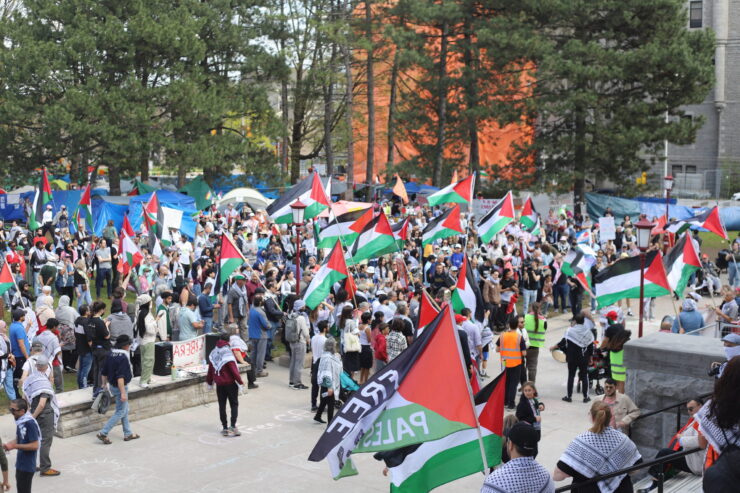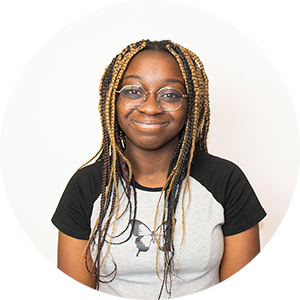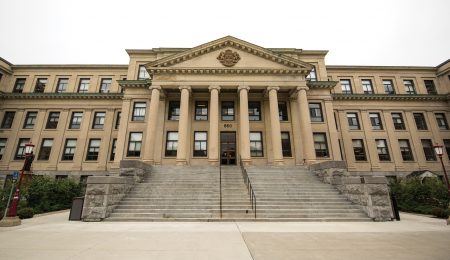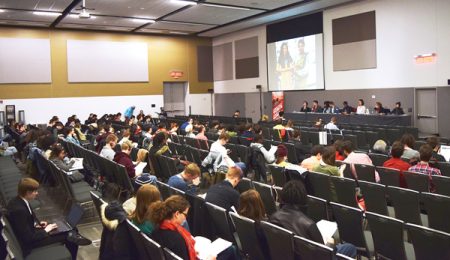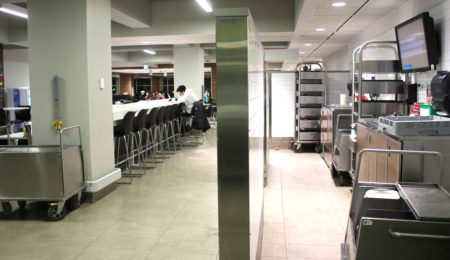Includes teach-ins, community support and encampment re-structuring
Apr. 27 — Student groups INSAF uOttawa and the Palestinian Students Association (PSA), at the University of Ottawa announced their intentions to stage a sit-in on Tabaret Lawn to demand the university divest any holdings in Israeli businesses and sever ties with Israeli academic institutions, as well as adopt the Arab Canadian Lawyers Association’s definition of Anti-Palestinian racism. This announcement came days after student-organized encampments began at other universities, including McGill University and the University of British Columbia.
On the evening of April 28, the U of O released a statement signed by Éric Bercier, associate vice-president of Student Affairs. Bercier quoted the U of O’s policy on the use of university space, emphasizing that “encampments and occupations will not be tolerated.”
Over the next week, the planned sit-in would evolve into an active encampment on the southeast corner of Tabaret Lawn.
Day One: Monday, April 29
Beginning at noon, U of O students gathered at Tabaret Lawn to protest for university divestment from businesses affiliated with the Israeli military and Israeli educational institutions, such as an exchange program between the University of Tel Aviv University.
Monday was originally planned to be a sit-in, with the possibility of extension should a proposed April 30 meeting between the organizers and the university administration not go occur to plan. However, INSAF confirmed that the university cancelled their proposed meeting.
NDP Member of Provincial Parliament (MPP) for Ottawa-Centre Joel Harden stopped by and dropped off food. Later, he penned a letter to university president Jacques Fremont in support of the encampment and urged the university to divest.
Speeches began at 1 p.m. from Students for Justice in Palestine (SJP) Carleton and INSAF, followed by a reading circle. Plenty of food and drink were donated by community members.
Executive committee members from the University of Ottawa Students’ Union (UOSU) made an appearance on Tabaret Lawn, and invited student leaders to an open discussion regarding an interim statement on the encampment. This came ahead of the scheduled Board of Directors (BOD) meeting on Friday, May 3.
Before the end of the afternoon, INSAF announced their extension of the sit-in until Friday, May 3. Attendance numbers reached a peak over of 250 people. Tear down began around 8:30 and the crowd had dispersed by 9 p.m.
Day Two: Tuesday, April 30
Continuing from the first day, protestors arrived to Tabaret Lawn around noon, continuing to voice their demands to the university. With tarps, books (some a part of the makeshift library by the Ottawa Socialist Literature Group), and art projects in tow, the attendees adjusted around the rain and grew to about 75 people.
Professor Daniel Rück, a member of Faculty for Palestine and history professor at the university, addressed protestors in the afternoon; a researcher in settler-colonialism and land theft, Rück discussed the Nakba and drew connections between settler colonialism in Israel and Canada.
Just after 7 p.m., protestors set up tents, turning the sit-in into an encampment. Although it was formed independent of the organizers, INSAF endorsed it; student organizers additionally asked that only university students participate in the encamping, and posted calls for donations to sustain them.
Day Three: Wednesday, May 1
With the first night of the student encampment completed — with about 10 tents present — students continued their campaign for divestment. To protect encampment attendees, a rope perimeter was established around camp, notably fencing off the southeast corner of Tabaret Lawn.
INSAF published a statement on Instagram to formally ask the university administration for a meeting to discuss their demands. “Now, in good faith, we are asking again for a meeting, and not only that, but we are letting you know, that until you disclose and divest, we will not rest,” the statement read.
In the evening, a masked individual spray-painted “Free Palestine” on the steps of Tabaret Hall. Although they were chased by security, they evaded capture after being picked up by a waiting vehicle.
The university additionally published a statement regarding “campus safety and freedom of expression”, reaffirming the right of students and staff to feel safe and respected. “To this end, we will continue to act in accordance with our policies and regulations to ensure the safety and wellbeing of all members of our community and allow them to move around freely on our campuses.” The statement additionally maintained that “communication channels with organizers are open”.
Additionally, experiences with agitators were described from the previous night and during the day. Encampment protestors were subjected to loud car honking late at night, yelling, and several attempts at filming the encampment.
On this day, a Quebec judge denied an injunction to break up the student encampment at McGill.
Day Four: Thursday, May 2
By the morning of the fourth day, the number of tents had increased tenfold to 30 tents in total on Tabaret Lawn. In addition, food, first-aid, and dishwashing stations were established to further de-centralize and better organize the encampment.
The morning began with clean-up by university employees: the keffiyeh and Palestinian flag that adorned the Father Joseph-Henri Tabaret statue were removed, and the spray paint from the previous evening was power-washed.
Sit-in attendees heard speeches from U of O full criminology professor and founding member of Criminalization and Punishment Education Project (CPEP), Justin Piché, as well as a speaker from the Independent Jewish Voices.
In the evening, leaders from the encampment met with university security staff to ensure safety is being prioritized. Earplugs and masks were distributed to attendees as protection from the ongoing construction at Tabaret Hall.
At 4 a.m. as well, a student encampment at the University of Toronto began.
Day Five: Friday, May 3
With the weekend approaching, the number of campers on Tabaret has only grown — organizers told the Fulcrum they had 51 tents in the encampment the night before, with an estimated 120 people spending the night.
Talks among student campers and volunteers were held, with the goals of increasing accessibility and hygiene within the encampment, as well as potentially acquiring a portable washroom.
On the evening of May 2, a separate meeting was held so organizers and university administrators could discuss safety concerns. Although the meeting did not address the issues of divestment and the students’ demands, one of the outcomes was the administration offering to call in a fire marshal for an inspection.
A camera was installed extending out of a third-floor window of Tabaret Hall.
The University of Ottawa Muslim Students Association (uOMSA) published a statement on Instagram, expressing their disappointment with the university’s statement from April 28 and extending their support to students “peacefully protesting and their constitutional right to do so as they call for complete divestment from all pro-genocidal corporations funded by the University of Ottawa”.
Nathan Prier, the president of the Canadian Association of Professional Employees (CAPE) spoke to protestors. At CAPE’s general meeting on April 30, a motion unanimously passed in support of the U of O encampment.
Day Six: Saturday, May 4
Following several days in the encampment, a town hall was held by camping protestors to discuss the living conditions thus far and how to improve them. A portable toilet was acquired by protestors, and aspects such as an isolation tent and shower station were discussed.
The University of Ottawa Students’ Union (UOSU) published a statement, following their board meeting the previous evening that was primarily in-camera. The statement supports calls for the university to “disclose its investments and to divest from companies and institutions that are directly or indirectly complicit in the occupation and violence being perpetuated on Palestinian territory”.
Over 200 attendees were present during the day, with community members and families participating in activities, teach-ins and chanting with students.
Independent MPP for Hamilton Centre Sarah Jama visited Tabaret Lawn, speaking in support of the encampment and student movements as a whole. “There has been no movement that has been instrumental in changing our civil liberties that have not been led by students,” she said. Jama, was kicked from the Ontario NDP Party in October, following her public support for Palestinians in Gaza.
Independent Jewish Voices Carleton held a vigil ceremony to “commemorate and pay tribute to the 40,000 people who have been murdered by Israel during the ongoing genocide”. Rabbi Liz Bolton, a member of Rabbis for Ceasefire, spoke at the ceremony. “We must hold onto hope for humanity … that justice and equality — deep justice, and deep peace — may reign for all who dwell between the river and the sea.”
For more details on the U of O encampment, you can follow the Fulcrum’s series here or our Twitter/X account here.

